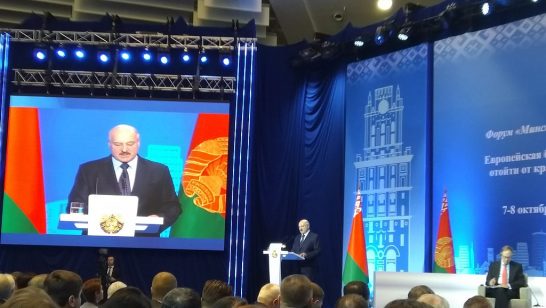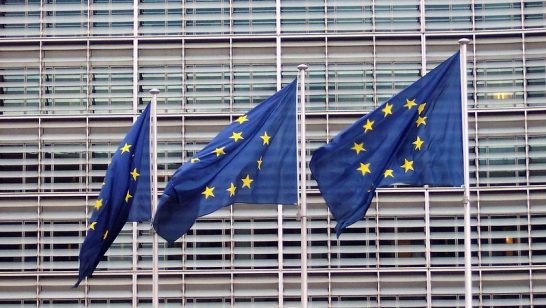
The emergence of slipper-wielding protestors on the streets of Minsk has only added to the growing interest in recent developments in Belarus. The country traditionally receives scant attention from commentators, diplomats, or defence planners. It is often written off as Europe’s last dictatorship and assumed to approximate a de facto Russian proxy in strategic terms. However, Minsk has recently courted growing Western attention as Lukashenka’s relationship with the Kremlin has soured. If emerging opposition protests are sustained or grow, they could become a dangerous moment in the Russia-West rivalry.
Presidential elections planned for 9 August are widely expected to return Lukashenka, who has dominated Belarusian politics since 1994, to a sixth term as President. This is not the first time that the run-up to elections have been marked by protest and crackdowns. In 2010, Presidential elections were marked by violence, and demonstrations in 2017 also put Belarus in the spotlight. In both cases, they subsided and Lukashenka remained in power, albeit in a chorus of protestation from international human rights organisations. The emergent slipper movement may well follow the same path. However, most commentators agree that Lukashenka is facing one of his greatest challenges yet. Even if current protests die down once again the situation in Belarus remains fragile and steeped in risk. Managing these risks effectively will demand a deeper understanding of the country in Western capitals than they have tended to afford it thus far.
Since 1994, the Lukashenka regime has rested its authority on the fulfilment of an economic bargain delivering full employment and stable living standards. That bargain is under severe strain, not least because relations with the Kremlin – which provides the cheap oil and export market that sustains it – have suffered badly in recent years. Minsk has resisted Putin’s effort to use Belarus’ membership of the ‘Union State’ and Common Treaty and Security Organisation (CTSO) to more closely integrate the two countries in political, economic, and military terms. However, Lukashenka has pushed back: refusing to allow Russia to build a new airbase on Belarusian territory or to entertain changes to the Union State which would formalise his status as a junior partner and reduce Belarus’ autonomy from Russia. More alarmingly for Moscow, Minsk has provided regional security guarantees to neighbouring states which appear designed to undercut Russia’s room for manoeuvre on its Western flank; flirted with the idea of participating in joint exercises with NATO; and conducted training with British Special Forces. Its most recent military doctrine seems to focus the country more on preparing for a hybrid war of the type seen in Ukraine than in delivering collective defence of the Union State alongside Russian forces.
None of this has gone unnoticed. Russia sought to tie the sale of fighter aircraft to a plan to establish a Russian airbase in Belarus and Jamestown Foundation analysis shows it was denied the favourable prices provided to other CTSO members. The Kremlin’s recent ‘tax manoeuvre’ and oil price adjustments have the potential to prompt an economic and fiscal crisis in Belarus. Russia has used its presence in the information space to undermine Lukashenka and emphasise historical ties between the two countries. The recent announcement of US oil shipments by Secretary of State Michael Pompeo would appear to be a direct, if largely symbolic, response. Lukashenka had appeared to be pursuing a closer economic relationship with the European Union, and ready to give ground on economic reform to secure financing from international financial institutions. Though, on its own, this does not seem to explain the EU’s decision to sign visa liberalisation agreements with Belarus, particularly given this came in the wake of 2019 elections which were widely condemned by monitors and human rights activists. Meanwhile, China’s deepening engagement in the economy and the security sector provides further confirmation that Belarus is fast becoming the latest arena of great power competition.
Thus, to an unusual degree, the eyes of leaders in key capitals will be trained on Minsk as protestors move to challenge Lukashenka’s authority. A statement issued swiftly by the US, EU and UK following the protests cautioned the Belarusian government that its respect for ‘universal fundamental freedoms’ would be central to “shaping future policy” toward Belarus. Free and fair elections, “untainted by malign influence” would “reinforce sovereignty” and “pave the way for greater cooperation with our countries and economic prosperity for the Belarusian people”. The potential source of such malign influence, or indeed the consequences for its appearance, remain unstated.
The dismissal of the sitting government, including of the Prime-Minister who was seen as relatively open to economic reform, suggest that Lukashenka is nervous. New appointments are dominated by the more conservative security establishment. While this does not in itself signal any rapprochement with Moscow, it bodes ill for those in Europe hoping for a Belarusian opening. Moreover, when Lukashenka warned that there would be “no Maidan” in Minsk and described protests and the opposition movement as being led from abroad it seems clear he was speaking to the Kremlin, which sees so-called ‘colour revolutions’ in its neighbourhood as a Western-led tool to threaten Russian interests. It is likely that Putin was listening. Belarus occupies a key strategic location in relation to the Suwalki Gap and holds a deep-rooted place in the Russian national psyche, perhaps comparable to that of pre-Maidan Ukraine. Moreover, it is conceivable that a weakened Lukashenka seeking Russian support could make concessions in a number of areas where Putin has tried and failed to reach agreement in recent years: for example, by allowing a more permanent Russian military presence in Belarus or transferring joint Belarus-Russian military units to the command of Russia’s western military district. In more extreme scenarios, Russian proposals for changes to the constitution of the Union State which would effectively extend Putin’s personal authority to Belarus could be on the table.
It is unclear how either the demonstrators or the West would respond. A recent poll showed that the Belarusian public was increasingly divided when asked whether they preferred integration with Europe and Russia. Western government’s instincts will be to support demonstrations as they did in Ukraine, to re-assert the offer of closer economic partnership in exchange for reform and to warn Russia against using its “malign influence” to deter Belarus from a European trajectory or keep Lukashenka in power. It should not overplay this hand: the Belarusian economy remains dominated by state-led ‘company towns’ which form part of value-chains deeply integrated with the Russian Federation. While reform is badly needed, EU integration is unlikely to provide Belarusian’s with alternative sources of employment or livelihoods in the short-term. The EU will want to, rightly, condemn human rights abuses and the repression of protestors. However, in doing so it should appeal for calm and avoid anything which closes doors for Lukashenka or politically ties the West to calls for a change in government. While distasteful, the reality is that the West’s capacity or will to take meaningful action in Belarus is limited. By contrast, if colour revolutions anywhere in its neighbourhood are seen by the Kremlin as a real and serious threat to security then a slipper revolution in Minsk is a waking nightmare. Backing Lukashenka into a corner is only likely to produce zero-sum outcomes which serve neither the interests of the West or those calling for greater freedom in Belarus.
The most recent protests may fade away as they have in the past. Regardless, the parallels between recent developments in Minsk and those in Kyiv in the years leading up to 2014 are palpable. Whatever happens next it is crucial that both the West and Russia tread carefully in Belarus. They must not allow a slipper revolution to let them sleepwalk into another crisis.
The opinions articulated above represent the views of the author(s) and do not necessarily reflect the position of the European Leadership Network or any of its members. The ELN’s aim is to encourage debates that will help develop Europe’s capacity to address the pressing foreign, defence, and security policy challenges of our time.
Image: Wikimedia commons



